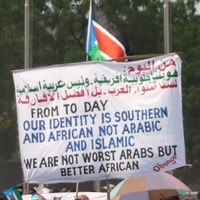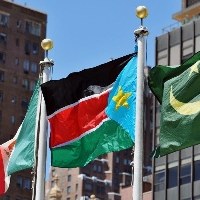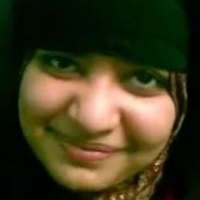![]()
Middle East Forum | by Aymenn Jawad Al-Tamimi
Originally published in Ha’aretz.
When the state of South Sudan came into existence last July, with great fanfare, Israel was one of the first nations to recognize it, having provided support for South Sudanese leaders since the 1960s during the first civil war. Indeed, in late December, Salva Kiir Mayardit — the president of South Sudan — came to Jerusalem, where he discussed the unique prospect of locating the country’s embassy there. It was therefore no surprise that President Shimon Peres spoke so enthusiastically of the visit as a “moving and historic moment” for him and Israel.
Now, less than a year later, in light of Israel’s plans to deport South Sudanese refugees, it is worth taking a look at how the world’s youngest nation is faring.
Arguably, the worst problem the country faces is tribalism, despite the unity that was cultivated among South Sudanese rebels during decades of resistance to Khartoum’s aggressive campaigns of Islamization against the animists and Christians in the south, prior to independence.
Early signs of this malaise became apparent when low-level clashes between the Lou Nuer and Murle tribes in Jonglei state in the east of the country — going as far back as 2009 — suddenly intensified in August 2011. By the start of 2012, over 3,000 were dead and more than 100,000 displaced. The origins of these tensions lie in the mutual theft of cattle.
In an attempt to calm tensions, an agreement was signed early this month to end the violence, by tribal leaders representing six ethnic groups in Jonglei: the Dinka (who are regarded as politically dominant in South Sudan’s government), Kachipo, Jie, Nuer, Anyuak and Murle.
Stability in Jonglei is crucial to South Sudan’s economic future, because it offers a potential pipeline route that can go through Ethiopia to Djibouti, making it possible for the country to export its vast oil reserves without having to rely on its northern neighbor. However, Sudan has not only imposed heavy transit fees on South Sudan; it has also permitted itself the liberty of seizing part of the oil production when those fees haven’t been paid.
Yet the unilateral decision to respond to Sudan’s policies by suspending oil production before it had laid an alternative pipeline can only be described as folly on the part of the leadership in Juba, the capital.
As a confidential World Bank report recently leaked to the Sudan Tribune revealed, the shutdown of the oil industry — together with the austerity measures subsequently adopted by the government — could increase the poverty rate from 51 percent this year to 83 percent by 2013, while infant mortality is expected to double in the same period.
The reason such startling statistics could become reality is that, like post-Saddam Iraq, South Sudan is extremely dependent on petroleum, with oil exports accounting for 98 percent of government revenue. Unfortunately, Mayardit and his cabinet appear to be oblivious to the implications of their decision-making.
Meanwhile, it is not only in the rural areas of South Sudan that tribalism is evident. The phenomenon extends even to the university campus in the capital. As the Dubai newspaper The National reported, a minor incident at a soccer match on March 27 among Juba University alumni led to a square-off between 100 students the following morning. Since then, the university has been closed.
The newspaper also interviewed the president of the student union at the university, Ajang Ajang, who pointed out that “people still think about their tribes first, their nation second.” Many members of the union sought to expel him after he decided to ban tribal associations on campus in February.
If such tribalism is evident on the country’s main university campus among students who will likely constitute South Sudan’s future elite, then it should come as no surprise that the president appears to be displaying authoritarian tendencies.
For when sectarianism and tribalism become institutionalized, it often follows that politicians become preoccupied with holding on to personal rewards of power instead of tackling national problems, and so a leading figure will probably emerge to assert himself as a strongman. Mayardit has been behaving in precisely this manner.
For example, The National recently highlighted the case of James Okuk, an employee of South Sudan’s foreign ministry. When he returned home from a trip to Brazil in October he was arrested by police, held at an abandoned house for four days and charged with “offending the president” simply because he wrote some articles critical of Mayardit’s tenure.
Okuk is now on trial. The case may partly have to do with the fact that Okuk’s uncle is Lam Akol, who broke away from the country’s ruling political faction — the Sudan People’s Liberation Movement (SPLM) — to form the Sudan People’s Liberation Movement: Democratic Change (SPLM-DC) in 2009.
Akol has reportedly been resented by the Dinkas who dominate the SPLM for quite some time, but he has the support of the Shilluk people of the country’s northeast. Of course, Akol’s residing in Khartoum while his children finish their schooling there hardly helps his image.
When South Sudan declared independence, there were high hopes for a model democratic country in sub-Saharan Africa, but developments so far point to a country plagued by tribalism, government authoritarianism and disastrous economic policies that could greatly exacerbate poverty levels in the country, such that one may have to agree with the World Bank’s fears of a “state collapse.” A bleak outlook indeed.
Aymenn Jawad Al-Tamimi is a student at Brasenose College, Oxford University, and an adjunct fellow at the Middle East Forum.



 RSS
RSS











Latest Comments
Hello Mike, Thank you for your positive feedback to the article. I felt there wasn’t too much critical analysis of ...
Thanks for this considered and well constructed article. A follow up article on the manner in which the editorial contro...
THE CLUELESSNESS OF CLAIMING THAT OBAMA'S MIDDLE EAST POLICIES WERE A FAILURE CANNOT BE FURTHER FROM THE TRUTH, WHAT THE...
As long as Obama is the president of the usa do not trust the us government......
Thank you for an good read....